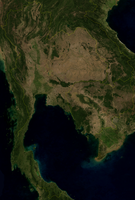
Photo from wikipedia
ABSTRACT Secure land access is vital for Myanmar’s upland households, who rely on crops and forests to meet their subsistence needs. But recent land reforms threaten to undermine customary tenure… Click to show full abstract
ABSTRACT Secure land access is vital for Myanmar’s upland households, who rely on crops and forests to meet their subsistence needs. But recent land reforms threaten to undermine customary tenure and land-use practices in Myanmar. This paper combines income accounting methods with access theory to assess how new legislation may affect four Chin communities in the country’s north-west. Our assessment of 94 households’ land-access mechanisms and economic benefits from different types of land reveals existing land-access inequalities among Chin households and demonstrates communities’ continued dependence on environmental resources, especially those from swidden fields, home gardens and forests. A majority of households would lose all of their land-derived income, if they were denied access to communities’ customarily governed land, e.g., under the Vacant, Fallow and Virgin Land Management Law. Policy stakeholders should therefore intervene, to alleviate land-access inequalities among Chin households and to direct Myanmar’s land-system dynamics onto more just development trajectories.
Journal Title: Journal of Land Use Science
Year Published: 2020
Link to full text (if available)
Share on Social Media: Sign Up to like & get
recommendations!